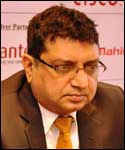 Shyam Sundar S. Pani,
Shyam Sundar S. Pani,
President,
GIREM
GIREM (Global Initiative for Restructuring Environment and Management) is an industry body focused on urbanisation, future cities, and eco-socio-economic infrastructure to help create better sustainable business eco-systems and societal infrastructure through public-private partnerships. Shyam Sundar S Pani, who started GIREM in order to provide a platform for city authorities to engage with infrastructure providers and job creators, spoke with Lalitha Rao on the critical issues of solid waste management in India.
What are the main issues and challenges in adopting PPP in solid waste management?
There is no standard formula followed in PPP in municipal solid waste management; it operates in a controlled environment with favourtism (shown) to a few contractors having the right influence and reach. This way it will create an obstacle to adopt new technologies and opportunities to new entrants.
What are your guidelines and policy recommendations for catalysing PPP in urban water supply and municipal solid waste management projects?
MSWM and water supply are to be dealt with locally and they have to utilise scientific methods and innovative technologies in delivering these services. Today, all the corporations and departments are working in isolation; the boundaries of jurisdiction of each urban service provider are different. Unless all these jurisdictional boundaries and departments are in phase, exchange good practices among similar corporations and departments from cities and utilise innovative technology in delivering urban services, we cannot expect improvement in this sector. We should encourage source segregation and zero landfill policy at the earliest before it becomes a major disaster.
What is the current status of MSW management in India and what are the factors that lead to slower growth in the sector?
At present, MSWM is being ignored, and it is not being dealt with proper planning in Indian cities. The corporations are working reactively rather than having a proactive sustainable, scalable long-term plan.
Though people say that it is lack of civic sense and awareness about the subject which is making it so pathetic, unfortunately it is other way round too. A lot of work has been done in improving the civic sense and create awareness but it is not being implemented properly.
What is GIREM’s role in waste-to-energy projects and how well is India established in segregation and storage of MSW?
GIREM is advocating and working towards waste to energy. Waste should not be dealt with as waste but rather as a resource to convert it to a useful energy.
India is not yet established in segregation and storage, but there is a huge opportunity if it gets practiced by all. We often hear people complaining that, in spite of handing over the segregated waste it gets mixed during the transit between the source and destination i.e. though people are slowly learning to segregate the waste at source the corporations have not yet pulled up their socks to maintain the segregated waste, in transportation and storage before it is reused or dumped to landfills. According to us, there will not be more than 5 per cent of waste which will go to landfill and every bit of the rest 95 per cent is a valuable resource which can be utilised in various industries as raw material or incinerate it to produce energy.
With rapid urbanisation in most cities and towns, there is a shift in the quantity and quality of waste generated across the country which contributes to a rising deficit between demand and supply of MSW services.
Yes, of course, the cities are getting a rising deficit between demand and supply of MSW services due to rapid urbanisation. The main reason or the root cause can be traced back to the planning process; as we said earlier, the city administrations are working more reactively and are busy solving yesterday’s problems than proactively planning for the future.
As you can recall, last year there were media reports with regard to municipal solid waste management in Bengaluru, the main reason being that the landfills of Bengaluru were created more than a decade back and that was meant for the Bangalore of yesteryears. No one has anticipated that Bengaluru will grow to the extent it has today; hence all the developments were reactive to the urban growth. The landfills or their services were not scalable to proportionately improve in sync with the rise in urbanisation.
What is GIREM’s outlook on waste-to-energy and the factors leading to the growth?
On adopting the GIREM recommendation on MSWM in a decentralised way and building a waste to energy plant at the Assembly constituency level, each unit can deliver the annual electricity consumption for almost 6,500-plus apartments and households and heating and hot water for approximately 13,000 plus apartments and households.
- Energy production per year: 190 GWh
- Of which district heating: 158 GWh
- Of which electricity is 32 GWh
- Capacity with combustion of 60,225 tonnes of waste per year
This can in turn translates into economic growth, by having reduced number of power cuts, and power supply at reduced cost per unit.
In your report, you have made some recommendations on waste to energy plants at assembly constituency level.
GIREM has compiled an integrated framework of recommendations which would be useful for not only Gurgaon but also other cities whose growth trajectory could be modeled on similar lines. These recommendations encapsulate creating awareness, policy and legislative issues, financial issues, management issues, supportive issues and enabling communities.
Creating awareness
Awareness about solid waste management and its importance to the health and hygiene, as well as for protection of the environment is of paramount importance. Even if people may be aware, they are not implementing the simple but very important task of segregating the waste at source (be it in homes or in corporate).
- There should be regular mass campaigns that emphasise segregation is relatively user friendly and extremely essential in the overall paradigm of solid waste management.
- Regular public campaigns can illustrate the entire lifecycle so that people do not perceive their role in isolation but realise its importance in the entire lifecycle of solid waste management.
- Promote information, education, and communication.
- Provide education and training programs, as well as enhance the administrative capabilities of local government officials and workers.
Policy and legislative issues
- The local government should formulate a long term strategy with a detailed implementation and monitoring plan.
- Periodic environmental audits of the MSW activities of each municipality should be conducted by independent third party auditors.
- The central government should provide fiscal incentives and encourage the recycling industry by adopting the appropriate technology through Green Productivity.
- The Government should encourage obtaining carbon credits in a simplified manner.
- Develop regulations and laws and also set up a mechanism for recovering materials, recycling, and source reduction to encourage the recycling industry.
- Review laws relating to SWM in accordance with the current situation and impose higher tariffs on commodities with packaging or that generate high volume of refuse.
Financial issues
Finance is an important resource for sustainable waste management. Generally most of the municipal corporations do not have many resources due to various constraints and priorities.
- Transparency in financial regulations by incorporating the double-entry system.
- Fiscal incentive to PPP projects that provide a capital incentive for SWM alternatives.
- To encourage private-sector participation, grants of soft loans, subsidies, and exemption from taxes including the duty for machinery and equipment.
- Wherever required, the central/state government should initiate actions to amend the municipal acts concerning incentives/disincentives. The “polluter-pays” principle is to be adopted, and the municipalities are to levy a SMW cess.
Management issues
- Green Productivity linkages and mandatory recovery will reduce the generated waste at both the manufacturing and consumer ends.
- Start public/private partnerships to counteract inefficient municipal workings.
- Open municipal buy-back facilities that would sell the usable items to the general public as well as to relevant industries.
Supportive Issues
- Promote public education programs through the electronic media.
- Encourage the participation of NGO, CBO, and self-help groups.
Enable Communities
- Corporate can come forward in providing specialised dust bins to the communities to segregate and store waste at the source itself.
- Corporations can have specialised transporting vehicles at three levels to carry the waste separately using the hub and spoke model.
Do you think the informal activity of ragpicking could be made more scientific, at least with the objective of waste segregation?
Yes, rag picking can be made more scientific and rewarding too. If we implement the decentralisation of municipal solid waste management at ward and assembly constituency level, we can create lots of employment opportunities for ragpickers who can be trained in scientific methods to segregate waste and picking useful recyclable wastes.
What are the main activities of GIREM in urban infrastructure sector, especially solid waste management in India?
GIREM is working towards solving the solid waste problem by decentralising the waste management process using the hub and spoke model. We have conducted a detailed study on solid waste management and published a report titled ‘Managing Municipal Solid Waste at the Assembly Constituency Level’.











